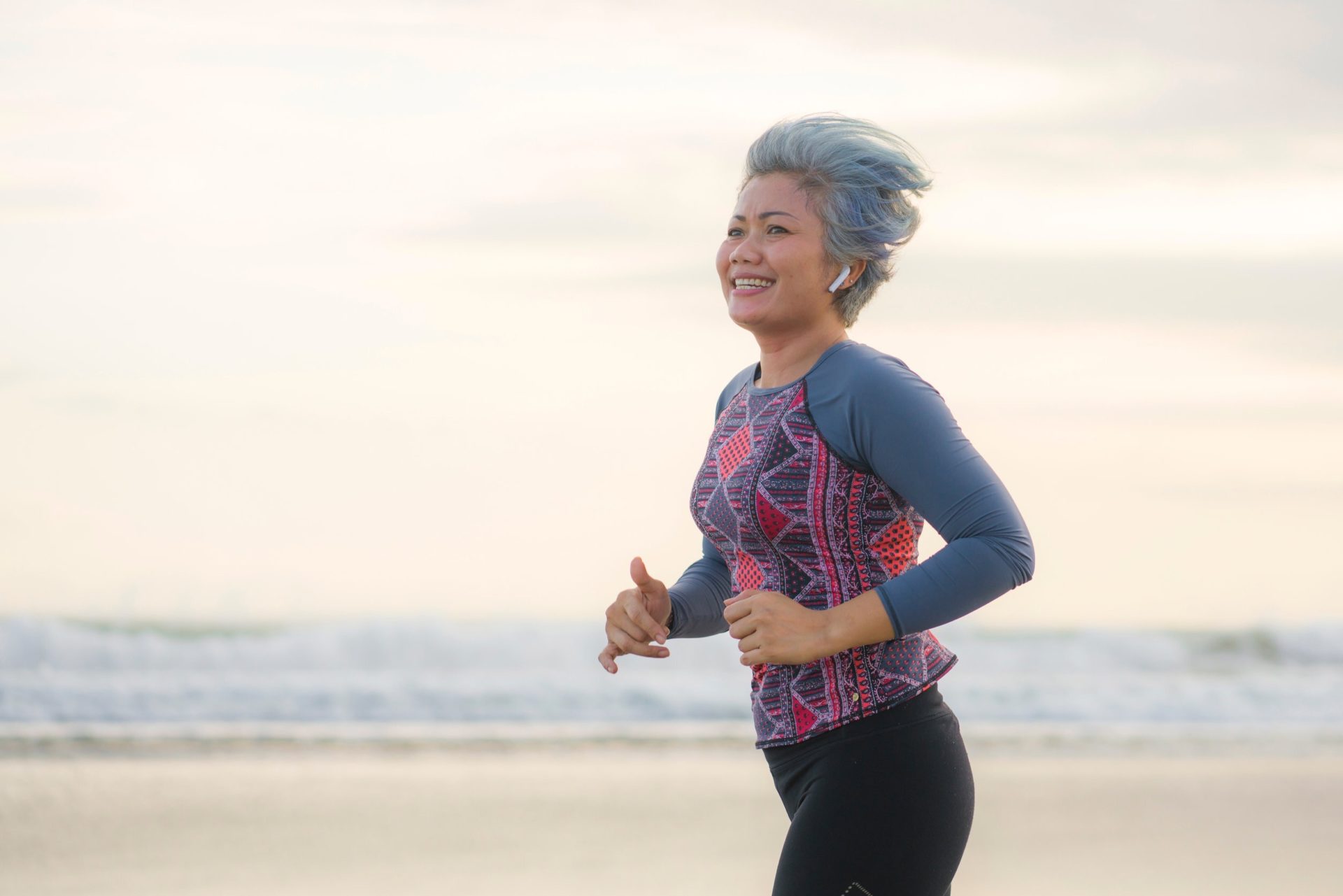Menopause doesn’t have to suck! Despite hearing horror stories of uncontrollably sweating during business meetings or waking up at 4am every night and unable to go back to sleep, some women have actually learned how to thrive during menopause. What’s their secret? They take care of themselves.
“Self-care allows women in menopause to make sure that their reserves are not depleted by all the demands around them and transitions happening inside,” says Gennev Health Coach Jessica Gingrich, RDN. “When we feel cared for and fulfilled, we are better able to tap into a mindset of ‘I will not only get through menopause, but I will grow and be stronger on the other side.’ ”
Here are seven essentials to take the best possible care of yourself during this stage of life. They will help you to manage your menopause journey better and set you up for long-term good health — physically, mentally, and emotionally — so you can enjoy a vibrant next chapter in your life.
The Essentials
- Take a walk. Or go for a run, ride your bike, swim, or take a Zumba class. “Cardio exercise is a one-stop shop for supporting your body and mind,” says Gingrich. It reduces anxiety and depression, short circuits stress, fights belly fat, eases joint pain, keeps your brain sharp, supports a more restful night’s sleep, and lowers your risk of heart disease, cancer, and more. Be sure to pick an activity you enjoy because you’ll be more likely to stick with it.
- Lift some weights. Strength training — whether with dumbbells, resistance bands, machines, or your own body weight — is crucial for maintaining lean muscle mass. As you get older and estrogen declines, you lose muscle mass and strength. Strength training builds muscle and strength, which boosts your metabolism, protects your joints, strengthens your bones, and reduces your risk for diabetes and other diseases.
- Pay attention to what you’re eating. “Taking time to reflect non-judgmentally on your diet can help you identify any new trends that have emerged,” Gingrich says. “You may notice that you are nibbling on leftovers without realizing it or that the nuts you are adding to your oatmeal are really satisfying you.” Awareness is the first step to making healthier changes in your diet. If you’re looking for an overall eating plan to follow, a good choice is the Mediterranean Diet. It incorporates many of these principles and others that improve heart and brain health.
- Drink more water. The changes in estrogen during menopause make it harder for your body to retain moisture. When your fluid levels are low, your body’s metabolic processes that produce energy slow down, leaving you feeling more tired and sluggish. Staying hydrated will help boost your energy and help to counteract various menopause symptoms, from brain fog and headaches to achy joints and dry skin. Aim to consume about half of your body weight in ounces of water. If you weigh 150 pounds, you should drink 75 ounces of water a day.
- Create a sleep routine. More than a third of adults don’t get the recommended seven to eight hours of sleep. But there are steps you can take to create a nighttime routine that will improve your chances of getting a good night’s sleep:
- Go to bed and get up around the same time every day.
- Avoid screens at least 30 minutes before bed (or more!).
- Keep your room cool and dark.
Sleep aids like CBD or melatonin may be helpful and, for some women, hormone-replacement therapy helps give them an edge on quality sleep, recommends Gingrich.
- Be kind to yourself. Menopause is unavoidable and unpredictable. “Giving yourself kindness through the journey allows you to accept that the process will not be perfect or controllable,” says Gingrich. “Work with your body and not against it to feel your best.”
- Find a menopause-specialist doctor. Most doctors, even gynecologists, receive little training in the post-reproductive years of a woman’s life, but it’s worth taking the time to find one with this expertise. All women will go through menopause, but only seven percent of them will get the help they need. Seeing a menopause specialist will ensure that you get the help you need to make your menopause transition smoother and set you up for longer-term good health.
To set yourself up for success, focus on one essential at a time and start with the easiest one for you. “Health habits tend to snowball,” says Gingrich. “As you successfully add one to your routine, it becomes easier to prioritize others.” If you need help making healthy lifestyle changes like these or others, you might want to enlist the services of a Gennev health coach who can guide you and keep you accountable.
[1] https://www.thensf.org/sleep-facts-and-statistics/
[2] https://thehelm.co/menopause-support-gennev/
Author: Michele Stanten


SIGH …. MORE SUBSTANTIVE INFORMATION WOULD BE WELCOME.
THIS IS SAME OLD SAME OLD … I was hoping for more from your site .
I’ve heard this before too. Drink more water, get your sleep, exercise! We should be doing that at all ages. There’s a blogger out of Ireland, called “My Second Spring” who has information and a nice community. I came across it a few years ago when I was at my last straw.